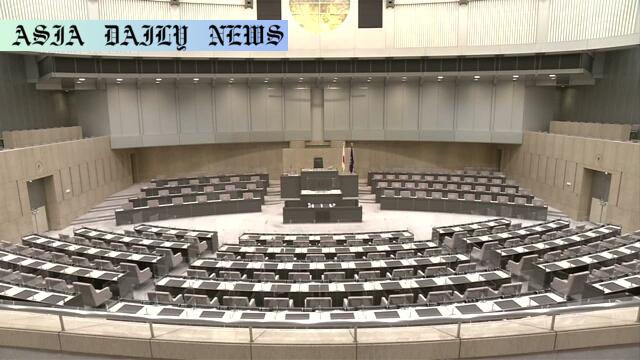Tokyo Assembly Election sees 295 candidates vying for 127 seats, acting as a prelude to the crucial Upper House election this summer.
Key Point 1: A historic 295 candidates are running for 127 seats in the Tokyo Metropolitan Assembly across 42 districts.
Key Point 2: Major political parties like the Liberal Democratic Party and TOMIN First are fielding high-stakes candidates.
Key Point 3: Observers anticipate intense campaigning as the election sets the stage for the Upper House elections this summer.
Key Point 4: Scandals and alliances are key focal points that could reshape Tokyo’s political arena.

A Record-Breaking Tokyo Assembly Election
The Tokyo Metropolitan Assembly election has kicked off with a historic 295 candidates competing for 127 seats across 42 districts. This marks the highest number of candidates in over 30 years, highlighting the significance of this election beyond its local importance. The election is seen by analysts as a prelude to this summer’s Upper House election, a critical national event that could shape Japan’s political future.
Major political parties like the Liberal Democratic Party (LDP), TOMIN First, and Komeito are vying to maintain or strengthen their positions in the Assembly. The LDP fields 42 candidates, while TOMIN First has 37, and Komeito 22. Other notable parties, including the Constitutional Democratic Party of Japan and the Japanese Communist Party, have fielded 20 and 24 candidates, respectively. Smaller parties and independent candidates are also in the fray, reflecting an intensely competitive political environment.
Scandals and Political Alliances Take Center Stage
This year’s election is under the shadow of a recent scandal involving some Assembly members of the LDP, accused of failing to declare revenue from fundraising events. This has increased scrutiny on the party’s integrity and credibility, potentially impacting voter confidence. Observers are closely watching to see whether the LDP, along with its allies TOMIN First and Komeito, will retain a majority in the Assembly. Their cohesion and ability to navigate political challenges will determine their future dominance in Tokyo’s governance.
At the same time, opposition parties are working strategically to capitalize on voter dissatisfaction. The Democratic Party for the People, Reiwa Shinsengumi, and other smaller groups aim to increase their influence by presenting themselves as alternatives to the current ruling coalition. Independent candidates and minor parties could also play kingmakers in case the major parties fail to secure absolute control.
Implications for Japan’s Political Future
The outcome of the Tokyo Assembly election will have a ripple effect on Japan’s political landscape. With the Upper House election just around the corner, the results of this local election could shift the balance of power at the national level. A strong performance by the LDP and its allies could bolster their confidence and leverage for upcoming challenges. On the other hand, significant gains by opposition parties might signal a changing tide in Japanese politics, providing them with momentum heading into the summer election.
Additionally, the election highlights broader issues such as voter engagement, the influence of scandals, and the role of coalitions in shaping policy. As such, the race not only reflects immediate political dynamics in Tokyo but also offers insights into themes that resonate nationwide. Whether the focus is on growth, governance, or addressing corruption, the Tokyo Assembly election promises to be a barometer for both public sentiment and political strategy.
Commentary
The Dynamics of Competition in the Tokyo Assembly Election
The Tokyo Assembly election is more than a routine political contest—it is a litmus test for Japan’s political parties, alliances, and narratives. With 295 candidates competing for just 127 seats, the stakes have never been higher. This election serves as a microcosm of the political challenges and opportunities that Japan faces at both local and national levels. As an observer, it is fascinating to see how issues such as governance, transparency, and coalition politics take center stage.
The Role of Scandals in Shaping Public Perception
It is impossible to ignore the role of scandals in this election. The LDP’s reputation has been tarnished by recent revelations involving undeclared revenue from fundraising events. This controversy poses a considerable challenge for the party, which is already under pressure to maintain its dominant position. For voters, this election is an opportunity to either endorse or reject the party’s handling of corruption and governance. It remains to be seen whether their past successes will outweigh current criticisms in the eyes of the electorate.
A Broader Reflection of Japan’s Political Climate
Beyond the individual parties and candidates, the Tokyo Assembly election is a reflection of broader political trends in Japan. With the Upper House election looming, this contest offers a preview of how parties might fare on the national stage. It also underscores the importance of coalitions, as parties like the LDP, TOMIN First, and Komeito work together to maintain a majority. At the same time, opposition parties and independents are making a concerted effort to disrupt the status quo, adding an element of unpredictability to the race.
In conclusion, the Tokyo Assembly election is a high-stakes event that will influence not only local governance but also the trajectory of Japanese politics. It is a moment of both challenge and opportunity, as all parties vie for their place in Tokyo’s future and beyond. As history unfolds, this election will undoubtedly be remembered as a significant chapter in Japan’s democratic journey.


